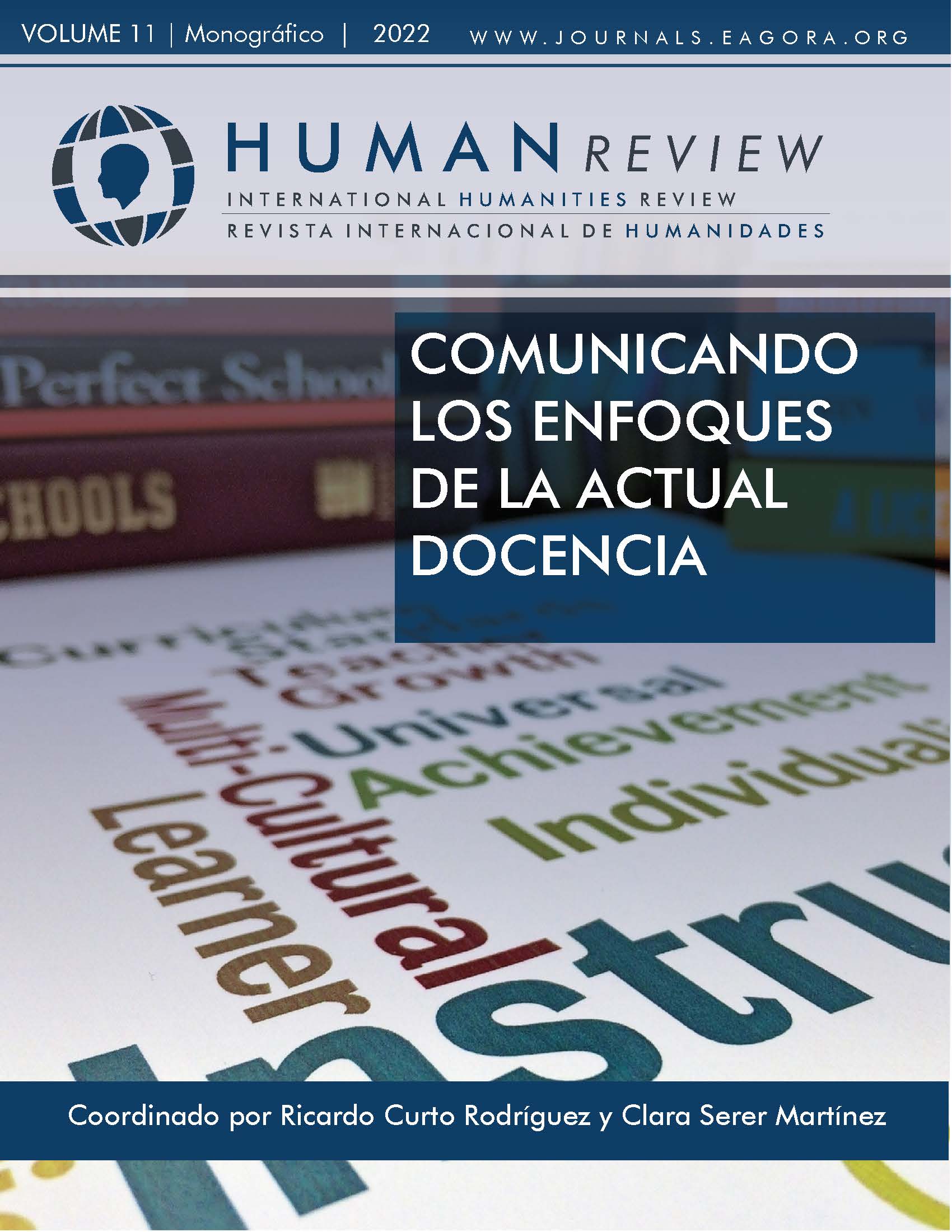Sostener las estrategias volitivas y mejorar la experiencia de estudiantes a distancia
DOI:
https://doi.org/10.37467/revhuman.v11.3874Palabras clave:
Educación Distancia, Experiencia Aprendizaje, Autorregulación, Motivación, Estrategias Volitivas, Diseño Tangible, EstudiantesResumen
El objetivo del estudio fue explorar el potencial del diseño tangible para sostener la voluntad en la educación a distancia. Se realizaron entrevistas semiestructuradas con seis estudiantes. El análisis fenomenológico interpretativo de las entrevistas evidenció las dificultades que pueden atenuarse mediante la implementación de estrategias volitivas como la estructuración del tiempo y el entorno, la gestión de las emociones y la motivación, y la investigación de apoyo social. Se propusieron cinco objetos tangibles para atender las necesidades del alumnado: el tubo de recompensa, el álbum de las victorias, el termómetro emocional, la gorra de aprendizaje y el guardián del tiempo.
Citas
Achtziger, A. y Gollwitzer, P. M. (2018). Motivation and volition in the course of action. En J. Heckhausen y H. Heckhausen (Eds.). Motivation and Action (pp. 485-527). Springer, Cham. https://doi.org/10.1007/978-3-319-65094-4_12
Atkinson, W. (2016). El poder de la voluntad. Greenbooks Editore.
Baumeister, R. F. y Vohs, K. D. (2018). Strength model of self-regulation as limited resource: Assessment, controversies, update. Advances in Experimental Social Psychology, 54, 67-127. https://doi.org/10.1016/bs.aesp.2016.04.001
Berrebi-Hoffmann, I., Bureau, M. C. y Lallement, M. (2018). Makers. Enquête sur les laboratoires du changement social. Seuil.
Borges-Solano, L. Y. (2015). El compromiso escolar de los estudiantes en República Dominicana: validación de su medida y de las variables de su red nomológica [tesis de doctorado, Universitat de València]. Repositorio Institucional https://roderic.uv.es/handle/10550/51020
Boud, D. y Prosser, M. (2014). Appraising new technologies for learning: A framework for development. Educational Media International, 39(3–4), 237–245. https://doi.org/10.1080/09523980210166026
Cirillo, F. (2018). The pomodoro technique: The life-Changing time-management System. Random House.
Cosnefroy, L. (2010). Getting to work and keeping on working: Troubles with self-regulation. Revue Française de Pédagogie, 170, 5–15. https://doi.org/10.4000/rfp.1388
De Smedt, T. y Daelemans, W. (2012). Pattern for Python. Journal of Machine Learning Research, 13, 2063–2067. https://dl.acm.org/doi/abs/10.5555/2188385.2343710
Deimann, M. y Bastiaens, T. (2010). The role of volition in distance education: An exploration of its capacities. International Review of Research in Open and Distributed Learning, 11(1), 1–16. https://doi.org/10.19173/irrodl.v11i1.778
Dornyei, Z. y Otto, I. (2007). Motivation in action: A process model of L2 motivation. Applied Linguistics, 4, 43–69.
Efklides, A. (2014). How does metacognition contribute to the regulation of learning? An integrative approach. Psihologijske Topics, 23(1), 1–30.
Fasse, L., Sultan, S. y Flahault, C. (2014). Le deuil, des signes à l’expérience. Réflexions sur la norme et le vécu de la personne endeuillée à l’heure de la classification du deuil compliqué. L’Evolution Psychiatrique, 79(2), 295–311. https://doi.org/10.1016/j.evopsy.2013.03.002
Fredricks, J. A., Filsecker, M. y Lawson, M. A. (2016). Student engagement, context, and adjustment: Addressing definitional, measurement, and methodological issues. Learning and Instruction, 43, 1–6. https://doi.org/10.1016/j.learninstruc.2016.02.002
Gable, S. L. y Haidt, J. (2005). What (and why) is positive psychology? Review of General Psychology, 9(2), 103–110. https://doi.org/10.1037/1089-2680.9.2.103
Gaggioli, A., Riva, G., Peters, D. y Calvo, R. A. (2017). Positive technology, computing, and design: Shaping a future in which technology promotes psychological well-being. En Emotions and affect in human factors and human–computer interaction (pp. 477–502). https://doi.org/10.1016/B978-0-12-801851-4.00018-5
Hassenzahl, M. y Tractinsky, N. (2006). User experience - a research agenda. Behaviour & Information Technology, 25(2), 91–97. https://doi.org/10.1080/01449290500330331
Heckhausen, J. (2018). Motivation and action: Introduction and Overvies. En J. Heckhausen y H. Heckhausen (Eds.). Motivation and Action (pp. 1-9). Cambridge University Press. https://doi.org/10.1017/CBO9780511499821
Houart, M. (2017). L’apprentissage autorégulé : quand la métacognition orchestre motivation, volition et cognition. Revue Internationale de Pédagogie de l’enseignement Supérieur, 33(2). https://doi.org/10.4000/ripes.1246
Houart, M., Bachy, S., Dony, S., Hauzeur, D., Lambert, I., Poncin, C. y Slosse, P. (2019). La volition, entre motivation et cognition : quelle place dans la pratique des étudiants, quels liens avec la motivation et la cognition? Revue Internationale de Pédagogie de l’enseignement Supérieur, 35(1). https://doi.org/10.4000/ripes.2061
Kaufmann, R. y Vallade, J. I. (2020). Exploring connections in the online learning environment: student perceptions of rapport, climate, and loneliness. Interactive Learning Environments, 1–15. https://doi.org/10.1080/10494820.2020.1749670
Klanten, R., Ehmann, S. y Hübner, M. (2009). Tangible : High Touch Visuals. Gestalten.
Kuhl, J. (2012). Action Control: The maintenance of motivational states. En F. Halisch y J. Kuhl (Eds.). Motivation, intention, and volition (pp. 279-291). Springer. https://doi.org/10.1007/978-3-642-70967-8_19
Massar, S. A. A., Csathó, Á. y Van der Linden, D. (2018). Quantifying the motivational effects of cognitive fatigue through effort-based decision making. Frontiers in Psychology, 9(MAY), 843. https://doi.org/10.3389/fpsyg.2018.00843
Pintrich, P. R. (2004). A conceptual framework for assessing motivation and self-regulated learning in college students. Educational Psychology Review, 16(4), 385–407. https://doi.org/10.1007/S10648-004-0006-X
Schueller, S. M. y Seligman, M. E. (2010). Pursuit of pleasure, engagement, and meaning: Relationships to subjective and objective measures of well-being. Journal of Positive Psychology, 5(4), 253–263. https://doi.org/10.1080/17439761003794130
Stiensmeier-Pelster, J. y Otterpohl, N. (2018). Motivation at School and University. En J. Heckhausen y H. Heckhausen (Eds.). Motivation and Action. (pp. 783-817) Springer, Cham. https://doi.org/10.1007/978-3-319-65094-4_18
Zimmerman, J., Stolterman, E. y Forlizzi, J. (2010). An Analysis and Critique of Research throungh Design: towards a formalization of a research approach. En Proceedings of the 8th ACM conference on designing interactive systems (pp. 310–319). https://doi.org/10.1145/1858171.1858228
Descargas
Publicado
Cómo citar
Número
Sección
Licencia
Aquellos autores/as que publiquen con esta revista, aceptan los términos siguientes:
- Los autores/as conservarán los derechos morales sobre la obra y cederán a la revista los derechos comerciales.
- Transcurrido 1 año desde su publicación, la versión del editor pasará a estar en acceso abierto en la web de la editorial, pero la revista mantendrá el copyright de la obra.
- En el caso de que los autores deseen asignar una licencia abierta Creative Commons (CC), podrán solicitarla escribiendo a publishing@eagora.org.








